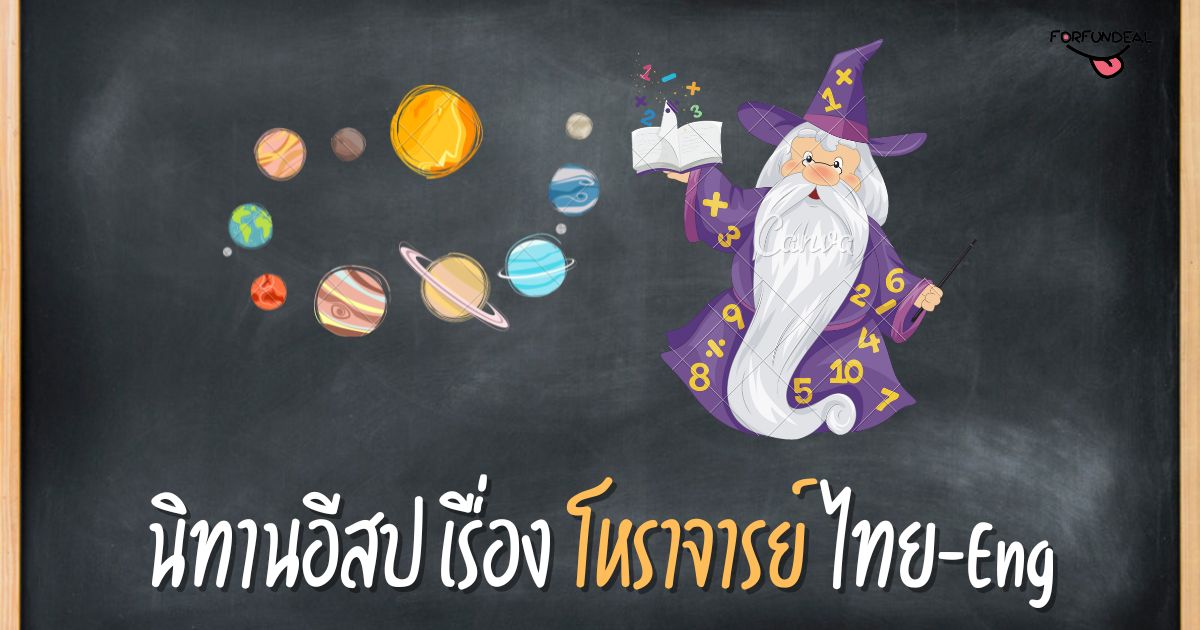“โหราจารย์” เป็นนิทานอีสปที่สอนเราถึงความสำคัญถึงความคิดที่ทำให้เราอยู่กับปัจจุบัน และอย่ากลัวในสิ่งที่ยังมาไม่ถึง เพราะชีวิตคือการเดินทางที่มีค่าในทุกๆ วัน
นิทานอีสปเรื่องโหราจารย์
กาลครั้งหนึ่งนานมาแล้ว มีโหราจารย์ผู้หนึ่งซึ่งมีชื่อเสียงในด้านความสามารถในการทำนายอนาคต ผู้คนจะมาจากทั่วสารทิศเพื่อแสวงหาคำแนะนำและสติปัญญาจากพระองค์ วันหนึ่ง ชายผู้อยากรู้อยากเห็นคนหนึ่งเข้าไปหาโหราจารย์และถามว่า “ช่วยบอกเวลาที่ตายของข้าได้ไหม”
Once upon a time, there was an astrologer who was renowned for his ability to predict the future. People would come from far and wide seeking his guidance and wisdom. One day, a curious man approached the astrologer and asked, “Can you tell me the exact moment of my death?”
โหราจารย์รู้สึกทึ่งกับคำขอของชายผู้นี้ จึงมองดูแผนภูมิและการคำนวณของเขา หลังจากครุ่นคิดอยู่ครู่หนึ่ง เขาก็พูดว่า “ข้าสามารถให้คำตอบที่คุณต้องการได้ แต่ข้าต้องเตือนเจ้าว่าการรู้เวลาตายที่แน่นอนของเจ้าอาจส่งผลที่ไม่คาดคิดตามมา”
The astrologer, intrigued by the man’s request, looked at his charts and calculations. After a moment of deep thought, he said, “I can provide you with the answer you seek, but I must warn you that knowing the exact moment of your death may have unintended consequences.”
ชายผู้นั้นยืนกรานที่จะรู้ จากนั้นโหราจารย์ก็เปิดเผยช่วงเวลาที่เป็นเวรเป็นกรรมแก่เขา ชายผู้ถูกครอบงำด้วยความกลัวและความวิตกกังวล ใช้ชีวิตที่เหลือด้วยความวิตกอยู่ตลอดเวลา พยายามหลีกเลี่ยงสถานการณ์ที่อาจนำไปสู่การเสียชีวิตที่คาดการณ์ไว้
The man, undeterred, insisted on knowing. The astrologer then revealed the fateful moment to him. The man, consumed by fear and anxiety, lived the rest of his life in constant worry, trying to avoid situations that could potentially lead to his predicted demise.
หลายปีผ่านไป ชายผู้นี้กลายเป็นนักโทษแห่งความกลัวของตัวเอง หลีกเลี่ยงประสบการณ์และโอกาสต่างๆ ด้วยความกลัวที่จะพบกับจุดจบที่ทำนายไว้ เขาพลาดความสุข ความรัก และช่วงเวลาที่มีความหมายนับไม่ถ้วน ทั้งหมดนี้เป็นเพราะความหมกมุ่นกับความตายที่ทำนายไว้
Years went by, and the man became a prisoner of his own fear, avoiding experiences and opportunities out of the fear of meeting his predicted end. He missed out on joy, love, and countless meaningful moments, all because of his obsession with his predicted death.
ในที่สุด ช่วงเวลาที่คาดการณ์ไว้ของชายคนนั้นก็มาถึง แต่ไม่ใช่ในแบบที่เขาคาดไว้ มันเป็นอุบัติเหตุธรรมดาๆ ที่ไม่เกี่ยวข้องกับสถานการณ์ที่เขาพยายามอย่างยิ่งยวดที่จะหลีกเลี่ยง เมื่อเขาหายใจเฮือกสุดท้าย เขาตระหนักได้ถึงความโง่เขลาของความกลัวและชีวิตที่สูญเปล่าที่เขาดำเนินมา
In the end, the man’s predicted moment arrived, but not in the way he expected. It was a simple accident, unrelated to the situations he had tried so desperately to avoid. As he took his last breath, he realized the foolishness of his fears and the wasted life he had led.

นิทานเรื่องนี้สอนให้รู้ว่า
“การหมกมุ่นอยู่กับอนาคตสามารถขโมยปัจจุบันของคุณไป ทำให้คุณไม่สามารถใช้ชีวิตได้อย่างแท้จริง”
- การใช้ชีวิตในปัจจุบัน: เรื่องราวเน้นย้ำถึงความสำคัญของการใช้ชีวิตในปัจจุบันและการยอมรับความไม่แน่นอนของชีวิต การหมกมุ่นอยู่กับอนาคตตลอดเวลาหรือพยายามควบคุมทุกด้านของชีวิตสามารถขัดขวางไม่ให้เราได้สัมผัสและชื่นชมกับช่วงเวลาปัจจุบันอย่างเต็มที่
- ความโง่เขลาของความกลัวที่มากเกินไป: ความกลัวอย่างท่วมท้นของชายผู้นี้ต่อความตายที่คาดการณ์ไว้กลืนกินเขาและขัดขวางไม่ให้เขามีชีวิตอยู่อย่างแท้จริง นิทานสอนเราว่าความกลัวที่มากเกินไปสามารถพรากความสุข การเติบโต และประสบการณ์ที่มีความหมายไปจากเราได้ มันกระตุ้นให้เราเผชิญหน้าและจัดการกับความกลัวของเราแทนที่จะปล่อยให้มันควบคุมเรา
- โอบรับสิ่งที่ไม่รู้จัก: ชีวิตเต็มไปด้วยความไม่แน่นอน และการพยายามทำนายและควบคุมผลลัพธ์ทุกอย่างนั้นไร้ประโยชน์ เรื่องราวเตือนใจให้เรายอมรับสิ่งที่ไม่รู้จักและเข้าใกล้ชีวิตด้วยความคิดและหัวใจที่เปิดกว้าง การเปิดรับความไม่แน่นอนทำให้เราปรับตัว เติบโต และพบกับความสวยงามที่คาดไม่ถึงในการเดินทาง
- สร้างสมดุลระหว่างโชคชะตาและเจตจำนงเสรี: แม้ว่าโชคชะตาอาจมีบทบาทในชีวิตของเรา แต่เรามีอำนาจในการกำหนดชะตากรรมของเราเองผ่านการเลือกและการกระทำของเรา นิทานกระตุ้นให้เราค้นหาความสมดุลระหว่างการยอมรับสิ่งที่อยู่นอกเหนือการควบคุมและการรับผิดชอบต่อชีวิตของเราเอง
“Obsessing over the future can rob you of the present, preventing you from truly living life.”
- Living in the present: The story highlights the importance of living in the present and embracing the uncertainty of life. Constantly obsessing over the future or trying to control every aspect of our lives can prevent us from fully experiencing and appreciating the present moment.
- The folly of excessive fear: The man’s overwhelming fear of his predicted death consumed him and prevented him from truly living. The fable teaches us that excessive fear can rob us of joy, growth, and meaningful experiences. It encourages us to confront and manage our fears rather than allowing them to control us.
- Embracing the unknown: Life is full of uncertainties, and trying to predict and control every outcome is futile. The story reminds us to accept the unknown and approach life with an open mind and heart. Embracing uncertainty allows us to adapt, grow, and find unexpected beauty in the journey.
- Balancing fate and free will: While fate may play a role in our lives, we have the power to shape our own destinies through our choices and actions. The fable encourages us to find a balance between accepting what is beyond our control and taking responsibility for our own lives.
โดยสรุปแล้วนิทานเรื่องนี้สอนให้เรายอมรับปัจจุบัน ปลดปล่อยความกลัวที่มากเกินไป โอบรับสิ่งที่ไม่รู้ และค้นหาความสมดุลระหว่างโชคชะตาและเจตจำนงเสรี มันเตือนให้เราใช้ชีวิตอย่างเต็มที่และแท้จริง ใช้เวลาแต่ละช่วงเวลาให้คุ้มค่าที่สุด แทนที่จะตกเป็นทาสของความกลัวหรือหมกมุ่นอยู่กับอนาคต

